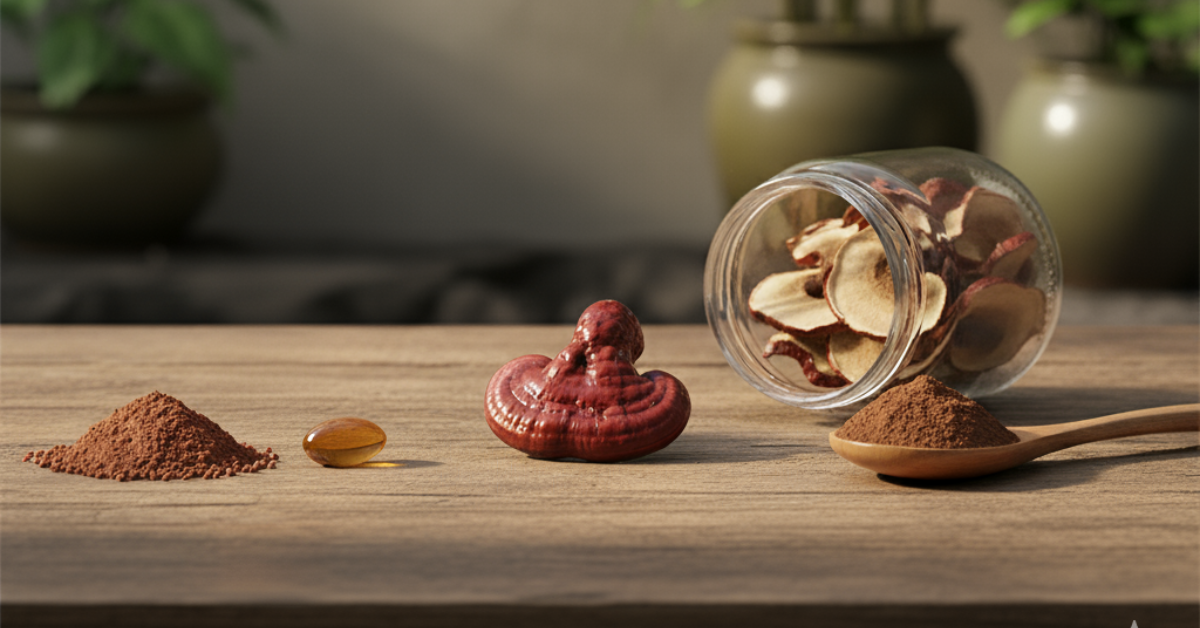Ganoderma lucidum, known as the “mushroom of immortality” in Traditional Chinese Medicine, has been used for over 2,000 years. It is renowned for enhancing immunity, slowing aging, and improving overall health. With modern technological advancements, different forms of Reishi extracts have entered the market, with the two most notable being Ganoderma spore oil and Reishi extract.
Although both come from the same fungus, they differ significantly in composition, potency, and health effects. Understanding these differences will help you choose the form best suited to your needs. This article will provide a detailed comparison of Ganoderma spore oil and Reishi extract, highlighting advantages and disadvantages, clinical evidence, and appropriate users.
What Is Reishi Extract?
Reishi extract is typically obtained from the mushroom’s fruiting body or mycelium. Using hot water or alcohol extraction methods, scientists can concentrate the active compounds and formulate them into powders, capsules, or liquid supplements.
Key Features of Reishi Extract:
-
Contains polysaccharides: Especially β-glucans, known for boosting immune response and supporting overall health.
-
Contains triterpenes: Has anti-inflammatory properties and potential anti-cancer effects.
-
Provides broad support: Often used for immune support, stress reduction, sleep improvement, and promoting longevity.
However, the potency of Reishi extract varies depending on its source, extraction method, and degree of standardization.
What Is Ganoderma Spore Oil?
Ganoderma spore oil is a highly concentrated oil extracted from mature Ganoderma spores. Spores are the reproductive cells of the mushroom, accounting for only 10–20% of the fruiting body’s weight, but containing much stronger active compounds.
Spores must undergo “wall-breaking” to release the compounds inside, then are extracted using supercritical CO₂ technology. This method preserves active compounds like triterpenes and polysaccharides while avoiding high-temperature damage.
Key Features of Ganoderma Spore Oil:
-
Highly concentrated: Contains higher levels of triterpenes and lipid-soluble antioxidants than regular Reishi extract.
-
Higher bioavailability: Oil-soluble compounds are more easily absorbed by the body.
-
Potent immune modulation: Enhances immunity and helps reduce chronic inflammation.
-
Typically formulated as softgels, prized for high efficacy and rapid absorption.
Ganoderma Spore Oil vs. Reishi Extract: Key Differences
1. Active Compound Concentration
-
Reishi Extract: Mainly contains water-soluble polysaccharides and some triterpenes; concentrations vary by extraction method.
-
Ganoderma Spore Oil: Contains higher concentrations of triterpenes, sterols, and lipid-soluble antioxidants, considered the most potent part of the mushroom.
2. Bioavailability
-
Reishi Extract: Some compounds have limited absorption, especially large polysaccharides.
-
Ganoderma Spore Oil: Oil form allows compounds to be more easily absorbed and utilized.
3. Mechanism of Action
-
Reishi Extract: Supports health by enhancing immune cell function, boosting antioxidant capacity, and modulating stress responses.
-
Ganoderma Spore Oil: In addition to the above, provides stronger anti-inflammatory and immune-regulating effects, helping reduce excessive immune reactions.
4. Scientific Evidence
-
Reishi Extract: Numerous studies support its effects on immune enhancement, anti-cancer properties, sleep improvement, and fatigue reduction.
-
Ganoderma Spore Oil: Fewer clinical studies, but animal and preliminary human studies suggest it may be more potent in immune modulation, anti-inflammation, and fatigue reduction.
When to Choose Reishi Extract
Reishi extract is suitable for:
-
Daily immune support: Ideal for those seeking overall wellness and disease prevention.
-
Stress reduction and sleep improvement: Research shows positive effects on insomnia and anxiety.
-
More affordable: Typically lower cost compared to spore oil.
However, for those needing stronger support, extract may be less potent than spore oil.
When to Choose Ganoderma Spore Oil
Spore oil is suitable for:
-
Individuals with weaker immune systems: e.g., recovering from illness or treatment.
-
Chronic inflammation or fatigue: More pronounced anti-inflammatory effects than regular extract.
-
Those seeking higher bioavailability: Oil form allows compounds to be absorbed faster and more effectively.
Spore oil is usually more expensive but considered one of the most potent forms of Ganoderma.
Safety and Precautions
Both Reishi extract and spore oil are generally considered safe when used appropriately, but note the following:
-
Anticoagulant effects: May enhance the effect of blood-thinning medications (e.g., warfarin), increasing bleeding risk.
-
Allergic reactions: Some may develop rashes or respiratory discomfort.
-
Pregnant and breastfeeding women: Insufficient data; use is not recommended.
-
Children: Limited research; not recommended for casual use.
Always consult a healthcare professional before starting supplements, especially for long-term use or when taking other medications.
Conclusion
Both Reishi extract and Ganoderma spore oil offer significant health benefits, but they differ in potency and suitable users:
-
Reishi Extract: Suitable for general daily use, overall health maintenance, immune support, stress reduction, and sleep improvement.
-
Ganoderma Spore Oil: Suitable for stronger immune support, anti-inflammatory effects, and fatigue reduction, especially for individuals who are weak or recovering.
Ultimately, the choice depends on your personal health goals, budget, and preferred supplement form. Both represent a combination of ancient wisdom and modern science, providing natural, effective support for immune and overall health.





